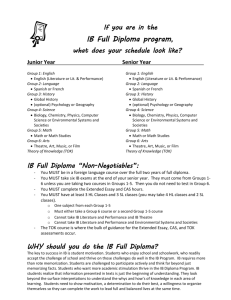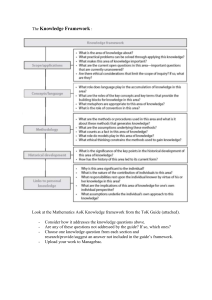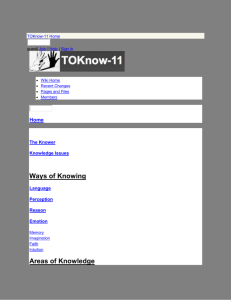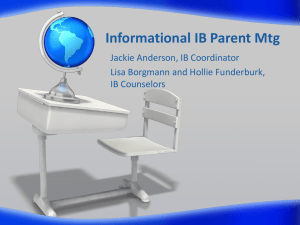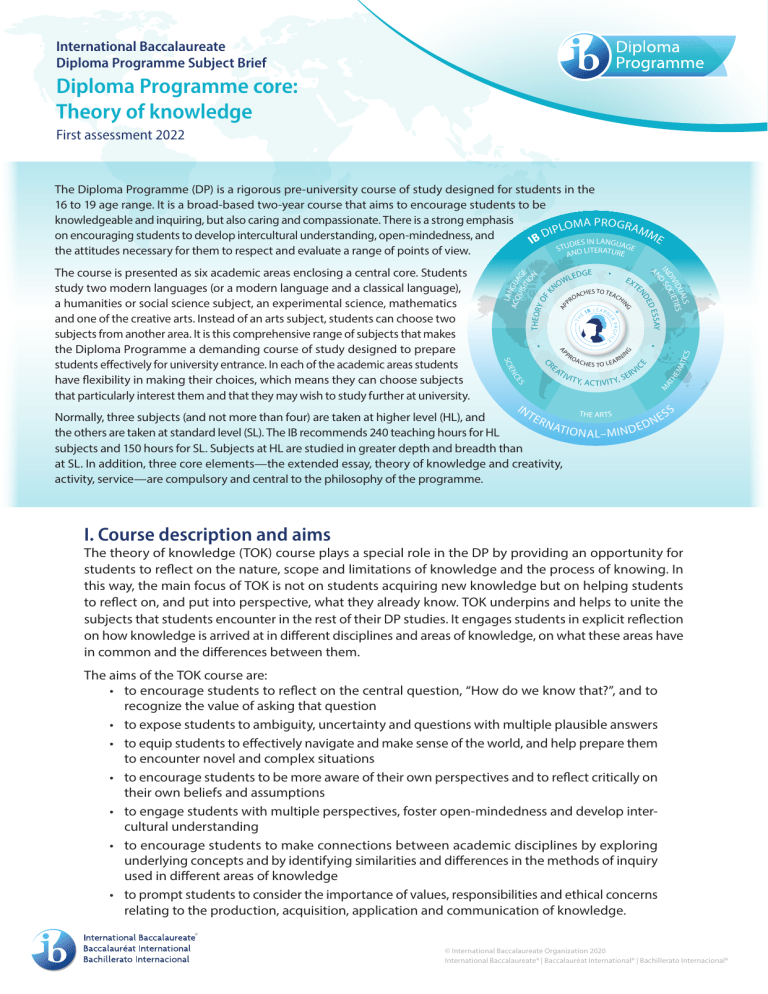
International Baccalaureate Diploma Programme Subject Brief Diploma Programme core: Theory of knowledge First assessment 2022 K AP OF THEORY EX CHES TO TEAC OA HI T NG PR A S UAL S VID TIE DI CIE IN SO ND SAY D ES DE ED G E EN WL NO S SE A C T I V I T Y, ATI CS RV I EM CE I T Y, NI AT H CHES O LE AR T M OA CE CR EN EA TIV NG AP PR S CI The course is presented as six academic areas enclosing a central core. Students study two modern languages (or a modern language and a classical language), a ­humanities or social science subject, an experimental science, mathematics and one of the creative arts. Instead of an arts subject, students can choose two subjects from another area. It is this comprehensive range of subjects that makes the Diploma Programme a demanding course of study designed to prepare students effectively for university entrance. In each of the academic areas students have flexibility in making their choices, which means they can choose subjects that particularly interest them and that they may wish to study further at university. LAN ACQ GUA UIS GE ITI ON The Diploma Programme (DP) is a rigorous pre-university course of study designed for students in the 16 to 19 age range. It is a broad-based two-year course that aims to encourage students to be knowledgeable and inquiring, but also caring and compassionate. There is a strong emphasis MA PROGRAM IPLO ME D on encouraging students to develop intercultural understanding, open‑mindedness, and IB DIES IN LANGUA STU D LITERATUR GE the attitudes necessary for them to respect and evaluate a range of points of view. E AN IN S T H E A R TS TE ES Normally, three subjects (and not more than four) are taken at higher level (HL), and RN N D AT I O E N A L– M I N D the others are taken at standard level (SL). The IB recommends 240 teaching hours for HL subjects and 150 hours for SL. Subjects at HL are studied in greater depth and breadth than at SL. In addition, three core elements—the extended essay, theory of knowledge and creativity, activity, service—are compulsory and central to the philosophy of the programme. I. Course description and aims The theory of knowledge (TOK) course plays a special role in the DP by providing an opportunity for students to reflect on the nature, scope and limitations of knowledge and the process of knowing. In this way, the main focus of TOK is not on students acquiring new knowledge but on helping students to reflect on, and put into perspective, what they already know. TOK underpins and helps to unite the subjects that students encounter in the rest of their DP studies. It engages students in explicit reflection on how knowledge is arrived at in different disciplines and areas of knowledge, on what these areas have in common and the differences between them. The aims of the TOK course are: • to encourage students to reflect on the central question, “How do we know that?”, and to recognize the value of asking that question • to expose students to ambiguity, uncertainty and questions with multiple plausible answers • to equip students to effectively navigate and make sense of the world, and help prepare them to encounter novel and complex situations • to encourage students to be more aware of their own perspectives and to reflect critically on their own beliefs and assumptions • to engage students with multiple perspectives, foster open-mindedness and develop intercultural understanding • to encourage students to make connections between academic disciplines by exploring underlying concepts and by identifying similarities and differences in the methods of inquiry used in different areas of knowledge • to prompt students to consider the importance of values, responsibilities and ethical concerns relating to the production, acquisition, application and communication of knowledge. © International Baccalaureate Organization 2020 International Baccalaureate® | Baccalauréat International® | Bachillerato Internacional® II. Curriculum model overview Course elements Minimum teaching hours Core theme: Knowledge and the knower This theme provides an opportunity for students to reflect on themselves as knowers and thinkers, and on the different communities of knowers to which we belong. 32 Optional themes Students are required to study two optional themes from the following five options. • Knowledge and technology • Knowledge and language • Knowledge and politics • Knowledge and religion • Knowledge and indigenous societies Areas of knowledge Students are required to study the following five areas of knowledge. • History • The human sciences • The natural sciences • The arts • Mathematics III. Assessment model Students are required to complete two assessment tasks for TOK. • Theory of knowledge exhibition • Theory of knowledge essay on a prescribed title Assessment objectives Having completed the TOK course, students should be able to: • demonstrate TOK thinking through the critical examination of knowledge questions • identify and explore links between knowledge questions and the world around us • identify and explore links between knowledge questions and areas of knowledge • develop relevant, clear and coherent arguments • use examples and evidence effectively to support a discussion • demonstrate awareness and evaluation of different points of view • consider the implications of arguments and conclusions. 50 Assessment details Type of assessment Format of assessment External Theory of knowledge essay Hours Weighting 10 2/3 or 67% Students are required to write an essay in response to one of the six prescribed titles that are issued by the IB for each examination session. As an external assessment component, it is marked by IB examiners. Internal Theory of knowledge exhibition 8 1/3 or 33% Students are required to create an exhibition of three objects with accompanying commentaries that explores how TOK manifests in the world around us. This component is internally assessed by the teacher and externally moderated by the IB at the end of the course. IV. Sample questions Specimen essay titles • How important are the opinions of experts in the search for knowledge? Answer with reference to the arts and one other area of knowledge. • Is the division of the natural sciences and mathematics into separate areas of knowledge artificial? • When historians and natural scientists say that they have explained something, are they using the word “explain” in the same way? • Are there fewer ethical constraints on the pursuit of knowledge in the arts than in the human sciences? • How do our expectations impact our interpretations? Discuss with reference to history and one other area of knowledge. • To what extent do you agree with the claim that “knowledge is of no value unless you put it into practice” (Anton Chekhov)? Answer with reference to two areas of knowledge. Sample exhibition prompts • What counts as knowledge? • On what grounds might we doubt a claim? • Are some types of knowledge less open to interpretation than others? • Is bias inevitable in the production of knowledge? • Should some knowledge not be sought on ethical grounds? • What role do experts play in influencing our consumption or acquisition of knowledge? • How can we distinguish between knowledge, belief and opinion? About the IB: For over 50 years, the IB has built a reputation for high-quality, challenging programmes of education that develop internationally minded young people who are well prepared for the challenges of life in the 21st century and are able to contribute to creating a better, more peaceful world. For further information on the IB Diploma Programme, visit: www.ibo.org/en/dp. Complete subject guides can be accessed through the programme resource centre or purchased through the IB store: http://store.ibo.org. For more on how the DP prepares students for success at university, visit: www.ibo.org/en/university-admission.
